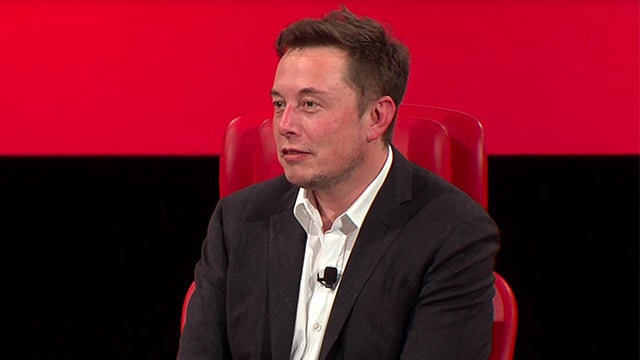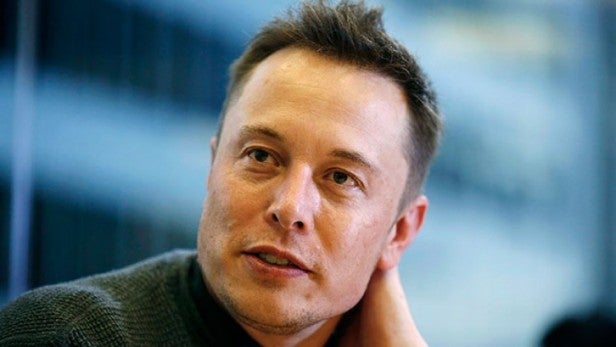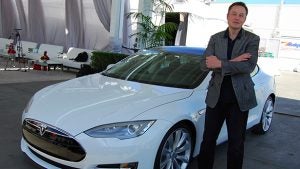Elon Musk’s maddest predictions: The craziest things he said at Code 2016

Elon Must says crazy things
Tesla, Space X, Paypal, and Solar City founder Elon Musk is known for making predictions about the future of technology. And his latest interview at Recode’s Code conference proved to be another trove of slightly insane-sounding pontifications.
Musk offered his opinions on everything from AI to how the human race might govern itself on Mars. If you feel like sitting through the entire interview, the video is below. Otherwise, read on for a full break down of the best, slightly worrying, moments from Musk’s Code interview.
1) We’re almost definitely living in the Matrix
One of the more unsettling statements Musk offered during his Code interview was his contention that we are unwittingly part of some grand simulation.
Speaking during the show, he said: “The strongest argument for probably being in a simulation is the following: 40 years ago, we had pong, two rectangles and a dot. That is what games were.
“Now 40 years later we have photorealistic 3D simulations with millions of people playing simultaneously and it’s getting better every year.
“And soon we’ll have virtual reality, augmented reality, if you assume any rate of improvement at all, the games will become indistinguishable from reality.”
Related: 9 predictions from a professional tech futurist
It certainly sounds a bit out there to say the least, but Musk might actually be on to something with this one. For one thing, Oxford philosopher Nick Bostrom agrees with him. Bostrom’s theory that our entire cosmos could quite easily be a simulation was perhaps explained best by neuroscientist Sam Harris.
As Harris puts it: “If we survive the next few centuries without annihilating ourselves, it is just a matter of time before we build computers capable of running virtual worlds populated by virtual people.
“…It seems tempting to conclude that simulated people will eventually outnumber all the real people who have ever lived. Statistically, therefore, it is more likely that we are simulated ancestors, living in a simulated world, rather than real ancestors of the real, supercomputing people of the future.”
So basically, all you have to do is accept the idea that one day we’ll advance to a stage where we can run realistic simulations, and the idea that these simulations will be more numerous than the real world, in order to agree with Musk and his fellow ‘simulationists’. Scary stuff…
2) How we would govern Mars… the planet
Musk has made no secret of his ambitions to send humans to the red planet via his Space X programme. The company is already planning to launch its first unmanned mission to Mars within two years and Musk has previously revealed he is expecting to launch a manned rocket by 2024. The mission would see the rocket arriving on Mars a year later.
So sure is he that his vision will become reality, that he took time during his Code interview to speculate on how best to govern these Martian colonies.
“Most likely the form of government on Mars would be a direct democracy, not representative,” he said.
“So it would be people voting directly on issues. And I think that’s probably better, because the potential for corruption is substantially diminished in a direct versus a representative democracy.”
Related: 5 things you need to know about the Tesla Model 3
 This man wants to blast you into space
This man wants to blast you into space
Essentially, Musk is suggesting a solution to earthly legislative problems by starting over from scratch. In space.
Musk also made clear his view that laws should be harder to create on the red planet: “I think I would recommend some adjustment for the inertia of laws would be wise. It should probably be easier to remove a law than create one.
“I think that’s probably good, because laws have infinite life unless they’re taken away.”
3) Humans will either become cyborgs or house cats
It wouldn’t be an Elon Musk appearance without some grim prophecies concerning artificial intelligence. The Space X founder has been vocal on the subject of AI in the past, previously stating that he believes it to be “the most serious threat to the survival of the human race”.
And Code provided Musk with the perfect platform from which to issue similarly ominous-sounding proclamations about the future of artificial intelligence. This time he urged the need for us all to essentially become cyborgs in order to stave off enslavement by AI overlords.
“Under any rate of advancement in AI we will be left behind by a lot. The benign situation with ultra-intelligent AI is that we would be so far below in intelligence we’d be like a pet, or a house cat. I don’t love the idea of being a house cat.”
Related: Cortana vs Google Now vs Siri
During his time on-stage, Musk voiced his support for a ‘neural lace’ – an electronic brain enhancement that would allow us access to online information and artificial intelligence.
““The solution that seems maybe the best one is to have an AI layer – a third digital layer that could work symbiotically [with your brain].”
So who will be fitting us all with these nightmarish devices? Well, Musk thinks he’s up to the task, if it comes down to it.
“Somebody’s gotta do it, I’m not saying I will. If somebody doesn’t do it then I think I should probably do it.”
No, you’re alright mate.

4) Self-driving cars are only two years away
At this point, it’s clear that no-one is quite sure when autonomous cars will arrive in consumer form. Most prominent figures in the industry are betting on a 2020 arrival at the very earliest, and even then most agree the first driverless vehicles will be part of for-hire services.
Of course, Mr Musk isn’t having any of it. During his interview he maintained that most of the issues surrounding autonomous cars have now been solved and that we could be seeing them on the road by 2017.
Related: Apple Car – Everything you need to know
“I consider autonomous driving to be a basically solved problem,” the Tesla CEO said.
“We’re less than two years away from complete autonomy. Regulators however will take at least another year – they’ll want to see billions of miles of data.”
Hey, if we’re going to trust this man to send us to Mars, operate on our brains, and awake us from our simulated reality like some smug billionaire version of Morpheus, surely we can trust him on when autonomous cars will arrive…

